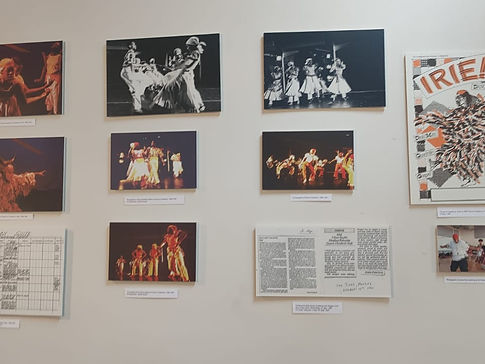Pioneers and Places Heritage Project


IRIE! dance theatre is Britain’s leading dance theatre company working in the field of African & Caribbean dance fusion. The IRIE! dance theatre archive documents the company’s pioneering educational, artistic and community-based programmes over its 37-year history. The Pioneers and Places project (July 2022-January 2024) made IRIE!’s archive more accessible to a wider audience of people not usually engaged in heritage through workshops, performances, talks and an exhibition.
Archiving
Our volunteers have been working with Archival Consultant Dr Etienne Joseph to organise and catalogue IRIE! dance theatre’s archive, focusing on the early performance company. We hope to make our archive publicly accessible soon. Please contact clare.parfitt@iriedancethreatre.org for more information.


Graduate Training Programme
From September to October 2022, a group of graduates from IRIE! dance theatre’s Diverse Dance Styles (BA Hons) participated in our Graduate Training Programme. They learnt a section of choreography from an early IRIE! dance work, Reggae Ina Yu Jeggae (1990-91), and discovered how to adapt it for delivery in different educational and community settings.
Volunteer Programme
We have established a successful volunteer programme, and our volunteers have contributed to every aspect of the project. Several of our volunteers have gone on to gain employment in the heritage and arts sectors, including archiving at The Guardian newspaper and the Dance Division at the Juilliard School, New York.

Reconstruction of Reggae Ina Yu Jeggae (1990-91)
In February 2023, we recreated a section of choreography from ‘Reggae Ina Ya Jeggae’, a dance work that featured in the company’s 1991 season entitled ‘let reggae touch your soul!’. Wieke Vink, one of our volunteers, was inspired by watching rehearsals for the reconstruction of ‘Reggae Ina Yu Jeggae’ to write a spoken word piece, which she presented live following the performance. Click on the YouTube link to hear her beautiful words, accompanied by photographs taken and edited by another of our project volunteers and IRIE! graduate, Laura Bodner.
Virtual Museum
We have worked with Nicky Donald, Research Technologist at Goldsmiths, University of London, to turn the Moonshot Centre into a virtual museum. Watch this space to access the virtual museum from this page soon.

Heritage Interviews
We have conducted a series of heritage interviews with a range of people who have been involved in IRIE!’s work over the last 38 years. The interviews were conducted by our wonderful volunteers. We will be gradually uploading the interviews here and in the Library of the Virtual Museum.
Exhibition
We curated an exhibition titled ‘Memories in Motion: A journey through IRIE!’s movement heritage’ which was open at the Moonshot Centre from 23rd October to 3rd November 2023. The co-curators were: Ashley Simpson, Nifemi Oni, Chiara Ciocia Vida, Jiya Zhang and Clare Parfitt. Volunteer Kerry Holland has created this digital map which conveys some of the themes and content of the exhibition for online audiences.
In October 2022 we screened the new film Pioneers and Protest: Seeking Change at Goldsmiths, University of London, accompanied by a panel discussion and Q&A. The film was produced by IRIE! dance theatre as part of the Pioneers and Protest project and focused on the Black People’s Day of Action in 1981, combining oral history interviews with people who took part in the 1981 demonstration and archive photographs.
Memories in Motion: New Perspectives on IRIE!’s Heritage
In November 2023 we held a panel discussion to accompany the Memories in Motion exhibition. Dr 'Funmi Adewole Elliott, Dr Etienne Joseph, Sheba Montserrat and Dr Clare Parfitt brought their unique perspectives to a discussion of IRIE!'s heritage. Drawing on their work in dance, archives, performance and cultural memory, the contributors reflected on the Pioneers and Places Heritage Project. The event included talks, performance and an opportunity to view the exhibition.

Kumina Queen film screening
In November 2023 we screened the new film Kumina Queen (2023), accompanied by a curated conversation between Dr ‘H’ Patten and the film’s director, Nyasha Laing, and a Q&A.
Kumina is a distinct, expressive spiritual folk form that travelled to Jamaica with Kikongo-speaking laborers from central Africa during the 19th century. Its basic elements are song, dance and trance possession. Imogene “Queenie” Kennedy was a contemporary priestess in post-colonial Jamaica who catapulted her African spiritual practice into renown. For centuries, the knowledge of traditional communities like Queenie’s has been hidden, erased, and forgotten. This film creates a vehicle for healing and the sharing of ancestral knowledge among cross-cultural audiences, women, artists and generations.
Pioneers and Places: Sharing IRIE!’s Heritage
In January 2024 we held an online event to share the results of our heritage project with national and international audiences. The event was chaired by Mercy Nabirye (Kauma Arts) and the presenters included: Dr Etienne Joseph (Consultant Archivist), Beverley Glean MBE (Artistic Director), Ofelia Balogun (Assistant Artistic Director), Nicky Donald (Research Technologist) and Dr Clare Parfitt (Heritage Project Co-ordinator).
Special thanks to...
Our volunteers: Josh Olakanpo, Wieke Vink, Keisha Rodony, Reyhan Sen, Laura Bodner, Will Christmann, Sonnah Amoi, Chiara Ciocia Vida, Ashley Simpson, Daniel Nii Tettei Tetteh, Oluwanifemi Oni, Soumya Srinivasa Sharma, Leo Cosgrove, Ruth Donaldson, Mo Clarke, Jiya Zhang, Kerry Holland, Aybainemi Ese
Dr Etienne Joseph – Archival Consultant
Dr ‘Funmi Adewole Elliott – External Evaluator
Nicky Donald – Research Technologist, Goldsmiths, University of London
The IRIE! Staff Team

The Pioneers and Places Heritage Project is made possible with The National Lottery Heritage Fund. Thanks to National Lottery players, we are making IRIE!’s archive more accessible to a wider audience of people not usually engaged in heritage.







